|
Seven winners received the Gender Equality and Mainstreaming Technology (GEM-TECH) Awards 2014 here in Busan on 28 October at a plenary session of the ITU Plenipotentiary Conference. ITU and UN Women launched this new global annual technology award in June 2014 to recognize individuals or organizations that demonstrate a commitment to advancing gender equality and women's empowerment through information and communication technologies (ICT). More than 360 nominations from over 70 countries around the world were received. The awards were open to leading women and men, as well as organizations working in the field of ICT and gender. Out of a total of 37 finalists, the following winners were chosen:
In
Category 1 (ICT applications, content, production capacities and skills for women’s social and political empowerment and links with sustainable development), the winner was
UNESCO – Women in African History: An E-Learning Tool.
The winner in
Category 2 (ICT applications, content, production capacities and skills for women’s economic empowerment and poverty reduction) was
iMerit Technology Services, India.
In
Category 3 (Promoting Women in the ICT sector – attracting, retaining and promoting women within the ICT sector and into decision-making positions in both the private and public sector), the winner was
BCS, the Chartered Institute for IT, United Kingdom.
For
Category 4 (Enabling girls to become ICT creators – initiatives aimed at providing girls with the opportunity to become not just active users, but creators of ICT and content), the winner was the
Research Center for Feminist Action (CIPAF), Dominican Republic.
The winner in
Category 5 (Closing the ICT gender gap — ensuring ICT accessibility for women, such as digital literacy training and ensuring affordable and meaningful access to ICT by women) was the
Telecentre.org Foundation — Telecentre Women, Philippines.
In Category 6 (Efforts to reduce online threats and to build women’s confidence and security in the use of ICT), the winner was South Africa’s Association for Progressive Communication (APC) – Take Back the Tech!.
The winner in
Category 7 (ICT and broadband strategies, policies and frameworks that promote women’s digital empowerment) was
Nigeria’s Federal Ministry of Communication Technology.
Gold partners sponsoring the awards were Oman, Rwanda, Switzerland, and the Bill & Melinda Gates Foundation, and Silver partners were Cisco Systems and Facebook.
Six global achievers
Also recognized at the GEM-TECH Award ceremony were the following six "Global Achievers": Alcatel-Lucent's StrongHer initiative; Cisco Systems' Chief Technology Officer, Monique Morrow; Academy Award winning actor and advocate and ITU Special Envoy for Women and Girls in ICT, Geena Davis; GSMA's Connected Women programme; Intel Corporation's Director of Social Innovation, Renee Wittemyer; and former Serbian Minister of Communications and State Secretary for Digital Agenda, Jasna Matić.
They were later presented their awards by President Paul Kagame of Rwanda at a gala dinner.
See GEM-TECH for more information on the award winners, and the GEM-TECH event itself.
President of Rwanda envisions a sustainable, inclusive and secure future
Paul Kagame, President of Rwanda, addressing the Plenipotentiary Conference after the GEM-TECH Award ceremony, said that the world has seen the immense opportunities of the connected and borderless world. "Our collective aspiration is to further extend these possibilities to all the world's people", he said. He saw the results of the election of ITU's top management as a resounding endorsement of the work of its leadership, and he thanked Dr Hamadoun Touré and his team for pushing the frontiers of ICT, and relentlessly advocating for access, even in the most remote areas.
"Their tremendous work has contributed to Africa's ability to leapfrog into the future." He saw this as being in large measure due to Dr Touré's vision and ability to mobilize private sector investment in ICT in the developing world. For example, at the time of planning for the Connect Africa Summit, which was held in 2007, USD 55 billion had been pledged. But in the end, more than USD 70 billion was actually invested.
President Kagame noted that in Africa ICT have improved communication between governments and their citizens, making leaders more accessible and promoting accountability. Beyond Africa, ICT are supporting openness between peoples, paving the way for real trust and greater understanding.
He said that Rwanda was honoured to host the Connect Africa (2007) and Transform Africa (2013) Summits, and that the most recent offspring of the summits was the Smart Africa Manifesto, which is shaping the future of ICT on the continent. Its strategy is founded on a future where the world's people are connected among themselves and with their environment, empowered by emerging technologies such as the Internet of Things, big data, and cloud computing. In this future, ICT continue to help humanity make advances in education and health care, ensure full security, and fuel economic growth through leaps of financial inclusion, innovation, job creation for youth as well as the empowerment for women.
"This is a future in which we are committed and one that we owe to future generations: one that is sustainable, inclusive, and secure", said President Kagame.
He then went on to present an Open Letter to delegates at the conference, from the Broadband Commission for Digital Development.
Working Group of the Plenary
The fourth and fifth meetings of the Working Group of the Plenary (WGPL) took place on Tuesday 28 October under the group's Chairman Musab Abdulla (Bahrain). WGPL considered and approved several revised and new draft resolutions, most of them with minor editorial comments from the floor.
Overview of approved resolutions
-
Revision of Resolution 183 ─
Telecommunication/ICT applications for e-health ─ proposed in contribution ACP/67A2/7, presented by Australia on behalf of Asia-Pacific.
-
Revision of Resolution 30 ─
Special measures for the least developed countries, small island developing states, landlocked developing countries and countries with economies in transition ─ proposed in contribution IAP/34R1-A1/25, presented by Paraguay on behalf of the Americas.
-
Revision of Resolution 135 ─
ITU's role in the development of telecommunications/ information and communication technologies, in providing technical assistance and advice to developing countries, and in implementing relevant national, regional and interregional projects ─ proposed in contribution IAP/34R1-A1/12, presented by the Bahamas on behalf of the Americas.
-
Proposal for New Resolution AFCP-4 ─
Implementation of Smart Africa Manifesto ─ proposed in contribution AFCP/69A2/1, presented by South Sudan on behalf of Africa.
In addition, revisions to Resolution 136 ─ The use of telecommunications/information and communication technologies for monitoring and management in emergency and disaster situations for early warning, prevention, mitigation and relief, were also approved, after the discussions and consolidation work of the ad hoc group on this resolution.
Creation of ad hoc groups
-
New ad hoc group to revise WSIS resolutions. A total of seven proposals (IAP/34R1-A1/27, ACP/67A2/5, RCC/73A1/19, ARB/79A2/7, EUR/80A1/10, RCC/73A1/18 and ARB/79A3/4) were presented to revise Resolutions 140 and 182 (WSIS and WSIS+10 review). These proposals were presented by Argentina, the Islamic Republic of Iran, the Russian Federation, the United Kingdom, and Saudi Arabia. After several interventions, the meeting agreed to create an ad hoc group to produce a consolidated revision of WSIS Resolutions. The groups will be chaired by Professor Minkin (Russian Federation), and should report back by the end of the week.
-
New ad hoc group on convergence. WGPL decided to create a new ad hoc group to discuss the proposal for a new resolution on
harnessing the benefits of convergence through the utilization of ICT applications, as presented in contribution ACP/67A1/17. The proposal, presented by the Republic of Korea, received overall support, with several countries requesting further work to avoid overlapping with other existing resolutions.
-
New ad hoc group on the Internet of Things. The WGPL decided to create a new ad hoc group to discuss the proposal for a new resolution on
facilitating Internet of Things (IoT) to prepare for a globally connected world, as presented in contribution ACP/67A1/18. The proposal, presented by the Republic of Korea, received overall support, with several countries requesting further work to avoid overlapping with other existing resolutions.
-
New ad hoc group on Resolution 176 (electromagnetic fields). A total of three proposals (ACP/67A1/15), (AFCP/69A1/13) and (ARB/79A2/11) were presented to revise Resolution 176 on
human exposure to and measurement of electromagnetic fields. After several interventions, the meeting agreed to create an ad hoc group to produce a consolidated text. The groups will be chaired by Nguyen Ngoc Canh, Viet Nam, and should report back by the end of the week.
-
New ad hoc group on Resolution 64 (Non-discriminatory access). A total of three proposals (AFCP/69A1/6, CUB/70/1 and ARB/79A2/3) were presented to revise Resolution 64 on
non-discriminatory access to modern telecommunication/information and communication technology facilities, services and applications, including applied research and transfer of technology, on mutually agreed terms. After several interventions, the meeting agreed to create an ad hoc group to produce a consolidated text, taking on board contribution AFCP/69A1/16 (draft new Resolution on non-discriminatory access to online services and applications used by ITU). The group will be chaired by the Republic of Korea, and should report back by the end of the week.
A mixed bag
WGPL also discussed the following topics, for which there were more than one proposal, and called for consolidation.
-
Revision of Resolution 182 and abrogation of Resolution 35. A total of six proposals (ACP/67A1/16, AFCP/69A1/14, RCC/73A1/28, ARB/79A2/12, EUR/80A1/12 and INS/82/1) were presented for the revision of Resolution 182 (Guadalajara, 2010) on
the role of telecommunications/information and communication technologies in regard to climate change and the protection of the environment, while two contributions (EUR/80A1/13 and UAE/86/3) requested the abrogation of Resolution 35. Although all proposals received broad support, the group favoured consolidating them into one document, ensuring that the suppression of Resolution 35 would not leave out any relevant provision. The Chairman requested Egypt to coordinate the consolidation work.
-
Revision of Resolution 137 and proposal for a draft new resolutionto promote efforts for early adoption of Software Defined Networking (SDN) in developing countries. The group expressed interest in discussing a consolidation of all proposals. The Chairman requested Belarus to coordinate this consolidation work.
-
Revision of Resolution 139. A total of three proposals (IAP/34R1-A1/38, AFCP/69A1/8 and ARB/79A3/3) were presented for the revision of Resolution 139 on
telecommunications/information and communication technologies to bridge the digital divide and build an inclusive information society. Although all proposals received broad support, the group expressed interest in discussing a consolidated text. The Chairman requested Egypt to coordinate this work.
-
A proposal (IAP/34R1-A1/42) for a draft new resolution on connectivity to mobile broadband networks was also discussed. Although the proposal received broad support, the group called for further work and the Chairman requested Canada to coordinate.
|
Quick Links
Photos and Videos
PP-14: GEM-TECH Awards
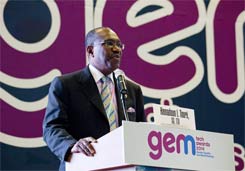
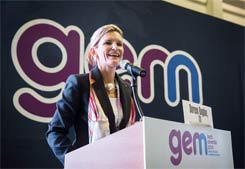

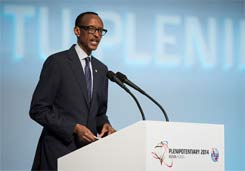
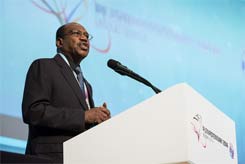
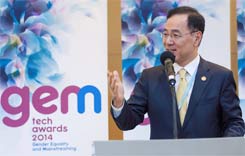
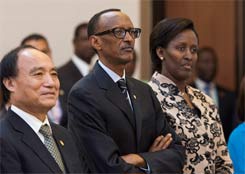
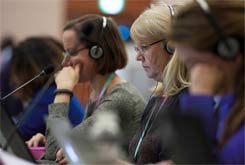
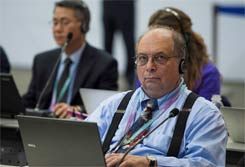
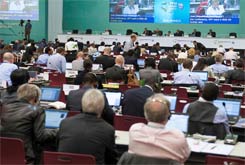
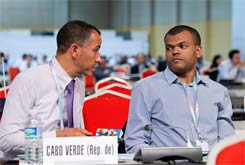
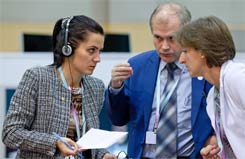
|
|
